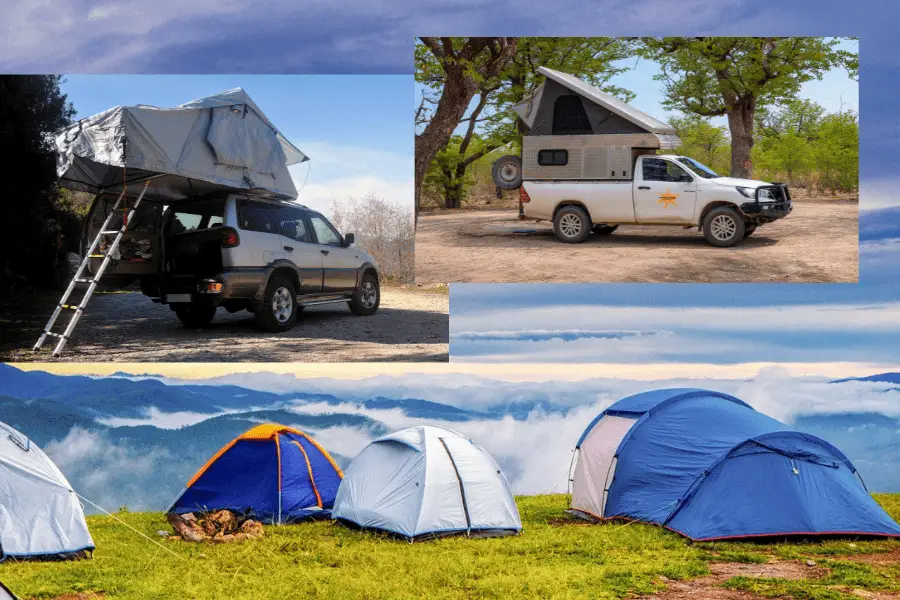
The debate about ground vs. rooftop tents has been going on for as long as rooftop tents have been around. But now there is a new twist to the discussion. Considering that most overlanders do not need a rooftop tent and prefer to keep their vehicle as light as possible. Therefore, it makes sense to look at the pros and cons of both options.
Let’s analyze the advantages and disadvantages of each option in different situations that overlanders might encounter. Let’s help you decide what type of shelter they should go for when purchasing an overlanding vehicle.
Rooftop Tents Vs. Ground Tents – Pros and Cons
| ROOFTOP TENTS | GROUND TENTS |
| PROS | PROS |
| Keeps vehicle lower and more stable. | Less expensive: $150 to $500 |
| Easy access for packing/unpacking | Lightweight (<100 lbs.) and easy to pack |
| Protects from animals and weather | Generally easier to set up |
| Very roomy for gear and games | More stable in high winds |
| CONS | CONS |
| More expensive: $500 to $2,000+ | More prone to moisture problems |
| Heavy and bulky: b/w 200 to 400 lbs. | Not tall enough to stand up in |
| Need a roof rack or aftermarket bars to carry it | Less protection from animals |
The Pros and Cons of Rooftop Tents
The Pros Of Rooftop Tents
This has been the most popular in overlanding for some time. It’s not hard to understand why either – the benefits are many. Some of those include:
- Keeps your vehicle lower and more stable.
- Easier access to the car for packing and unpacking.
- Provides a secure shelter above you, so you can sleep without worrying about animals or weather.
- Lots of room inside to store gear and play games (but more difficult to stand up).
The Downsides of Rooftop Tents
The downsides usually revolve around price, ease of use, and storage space:
- They are generally more expensive than ground tents. Depending on the model, it could be anywhere from $500 to $2,000+. For us, that is a big jump in price.
- They can be extremely heavy and bulky (most weighing between 200 to 400 lbs), making them difficult to pack around on the vehicle while not in use.
- You’ll need a roof rack or aftermarket bars on your vehicle with crossbars to carry it. This shouldn’t be too big of an issue if you have an SUV. But keep that in mind when shopping for one.
The Pros and Cons of Ground Tents
Pros of Ground Tents
A ground tent is precisely what the name implies. It’s set up on the ground against some surface. There are many benefits of these over their rooftop counterparts:
- Cheaper, costing anywhere from $150 for a base model to $500 for the best ones. The price generally increases with how “high-tech” they are (more mesh, more zippers, etc.).
- They are lightweight and easy to pack (most weighing less than 100 lbs). Unless you get a large one, it will fit right in the back of your vehicle without having to worry about overhead storage space.
- They are easier to set up, in our opinion. Sometimes we are just too tired or lazy to deal with all the straps needed when setting up a rooftop tent. This is especially true if it’s raining or cold outside. Depending on your tent, setting up can be done in minutes rather than an hour or two. Also, it’s much easier to do when you’re by yourself.
- If it’s very windy where you are, a ground tent will not go flying away! It may flap around, but it won’t leave without you in the middle of the night. That has happened many times before, and we were always scared to death that our rooftop tent would take off while we were sleeping inside.
Downfalls Of Ground Tents
The downfalls mainly revolve around space, access to gear, and weather conditions:
- Since they are on the surface of the ground, they are more prone to moisture problems. This is why most come with mesh windows for ventilation or have some rain fly that can be attached if needed. You must keep this in mind when setting up because you could get sand or dirt inside if it’s windy.
- Most ground tents are not tall enough to stand up straight in. This can be a hassle for getting dressed, going to the bathroom, and storing gear.
- Since they sit on the ground’s surface, there is no protection from animals crawling underneath at night (We’ve had this happen too). You must make sure your vehicle doors are securely locked at all times.
Situations When To Use Rooftop Tents and Ground Tents?
With all of the different options available for vehicle-based camping, there are sometimes situations in which one option is more practical than the other.
For instance, even though rooftop tents provide superior protection from the elements compared to ground tents or truck beds. Their utility is vastly limited during snowstorms because they’re located too high up on the roof of a vehicle.
Consider Individual Challenges When Overlanding
When you’re making plans for your overlanding adventure, it’s essential to consider the individual challenges you’ll face and how they affect what type of equipment will work best for each situation. Given this statement, below are some sample situations in which one tent would be more suitable than another.
- If you plan on visiting an area where mosquitoes are so thick that they get stuck in your teeth and leave painful welts all over your skin, a ground tent is probably best for you since it’s off of the ground. This means that when you wake up in the morning, there won’t be any mosquito corpses or dried blood on your face, neck, or legs.
- If you’ll be traveling through areas where rain showers are more frequent than not, using a rooftop tent would be impractical since water tends to pool on top of hard surfaces when it rains. As such, if you’re camping in one area for an extended period, then this could end up causing rust or corrosion damage to your vehicle by repeatedly exposing it to moisture.
When making plans with your traveling companions, you should also consider the winter season and determine what kind of vehicle would be the ideal for everyone to travel in.
If you’re planning on visiting an area that gets packed with snow during this time of year, then using a truck bed or flatbed trailer with ground tent camping is probably best for your group since you can stay above all of the slushes and leave your vehicle intact for future trips.
Which Tent Set Up Is The Most Practical?
With just these few examples, it’s easy to see that there are times when rooftop tents and ground tents aren’t practical, and other options need to be used instead.
However, no matter which type of camping you prefer, always remember that each trip will present unique challenges, so taking along specific equipment isn’t always appropriate. In most cases, being adaptable is the best option.
So, Which Should I Get?
The correct answer is: It depends! Many factors go into this decision-making process, such as how frequently you will use it, where you plan to go, what type of weather conditions you will encounter, how many people are at your party, etc.
Aluminum Crossbars?
If you get a rooftop tent, remember that most come with aluminum crossbars for mounting on your roof rack bars. This is very important because if not properly installed, they can cause damage to the interior of your vehicle while driving down the road.
There’s nothing worse than hearing constant flapping sounds while trying to go to sleep or pulling, overthinking something is wrong with one of your vehicle’s wheels only to find out it’s just the tent being loud.
Electric Option For Rooftop Tents
Also, some rooftop tents have an electric option which means you need access to electricity at night (most likely a generator). You must be careful where you park when sleeping since running headlights will drain car batteries quickly.
- If you’re going to backpack into the backcountry with no roads, then a ground tent is ideal because of its lightweight and compactness. You can strap it to almost any pack frame to carry with ease!
- We recommend a rooftop tent if you plan on taking long road trips, so you don’t have to set up your camp every night. They are more comfortable, offer storage space, faster setup time, and protection from the rain. The only thing we don’t like about ours is that we can’t stand up in it, which makes changing clothes or using the bathroom annoying at times. Sometimes it’s just nice to be able to stand up inside your tent. Therefore if that’s important for you, we would recommend getting a taller ground tent.
- If you plan to do both, go with a rooftop tent with an annex room or tall enough to stand up in. Doing this will allow you to carry less weight when backpacking while still having the comfort of your vehicle at night. It’s the best of both worlds!
Third Option: Sleeping Inside The Vehicle
There are many ways to enjoy an overland adventure – and we want you to experience that adventure your way. The following describes scenarios when it may be better to sleep inside the vehicle rather than in a rooftop tent or ground tent:
- When there is easy access and demand for high-exposure (and thus commercial) camping (i.e., places with lots of other people).
- In areas where scorpions, snakes, coyotes, bears, etc., might be present.
- In places where camping restrictions apply, parking is unrestricted.
- Popular destinations, such as National Parks, have limited space available for tents only or only offer paid campsites.
- When off-roading, there is a high likelihood of vehicle damage.
- While traveling in developing countries, where it may be unsafe to sleep outside the vehicle at night because of security reasons.
- When entering locations that are classified as “sensitive,” such as military bases, government installations, etc.
- In environments where excessively high temperatures have been forecasted during the daytime.
- Always leave time to set up your tent when bad weather hits or its getting dark.
Weigh all your options beforehand. Sleeping inside the vehicle during your next adventure might help you get out of a sticky situation easier!
Final Thoughts
No matter what type of camping gear you decide to buy, make sure it’s made by a reputable company that stands behind its product if something goes wrong. You never know what mother nature can throw at you, so don’t be caught off guard!
We hope this article helped clarify what each type of tent offers and why they both deserve a spot in every overlander’s garage/storage/shopping list.
Learn more about rooftop tents here.

